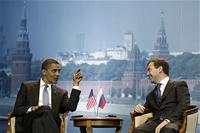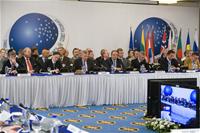There will not be a change in Russian-Bulgarian relations, according to Vesela Cherneva
Adelina Marini, July 10, 2009
 Bulgarian-Russian relations again will be in the field of economic relations. However it is expected that a new round of negotiations could be held on the second Bulgarian nuclear power station "Belene" which is of strategic importance for Russia. This is the forecast of the analyst from the European Council for Foreign Relations Vesela Cherneva, asked by euinside to comment on the first visit of Barack Obama to Moscow. "I think that we will talk about specific projects and about cooperation in the economic field which might change its modus, but generally, I cannot imagine any radical changes or any radical negativism related to Russia. And this is dependent on the fact that 66% of Bulgarian population supports Russia, so there is no politician in Bulgaria that could escape this fact".
Bulgarian-Russian relations again will be in the field of economic relations. However it is expected that a new round of negotiations could be held on the second Bulgarian nuclear power station "Belene" which is of strategic importance for Russia. This is the forecast of the analyst from the European Council for Foreign Relations Vesela Cherneva, asked by euinside to comment on the first visit of Barack Obama to Moscow. "I think that we will talk about specific projects and about cooperation in the economic field which might change its modus, but generally, I cannot imagine any radical changes or any radical negativism related to Russia. And this is dependent on the fact that 66% of Bulgarian population supports Russia, so there is no politician in Bulgaria that could escape this fact".
According to Mrs. Cherneva, the priorities of Bulgarian foreign policy are already drawn and it is unlikely the figure of the future foreign minister of Bulgaria to change them: "I don't believe that such publicly sensitive issue like the relations with Russia or the US could be dependent on the single personality of the foreign minister", she commented.
And regarding the contradictory results from the first visit of Barack Obama to Moscow, Vesela Cherneva outlined 3 basic news: "The first news is that they have agreed on the corridor to  Afghanistan. This was definitely unexpected and had been negotiated really in the very last moment. Besides, the document for the nuclear disarmament had also been prepared in some kind of urgency so this can also be counted as a success. Another news is that both sides have not agreed on having common position on the future of Ukraine or Georgia. The visit of Obama did not turn into sensation as it traditionally does elsewhere. He was not greeted as a star. His public speech was not aired live on TV. Generally, this visit was quite strict and in a very business context".
Afghanistan. This was definitely unexpected and had been negotiated really in the very last moment. Besides, the document for the nuclear disarmament had also been prepared in some kind of urgency so this can also be counted as a success. Another news is that both sides have not agreed on having common position on the future of Ukraine or Georgia. The visit of Obama did not turn into sensation as it traditionally does elsewhere. He was not greeted as a star. His public speech was not aired live on TV. Generally, this visit was quite strict and in a very business context".
Many international commentators pointed out thought that a large part of the agreements in Moscow have actually been agreed before but with other American presidents. To this Vesela Cherneva responded: "The truth is that Russia made concessions on the most of the important for the US issues in a situation, quite recent in Russian-American relations, was not very warm. In this sense, obviously, Russia also understands that pushing the reset button will happen only once that this is chance for both countries, not only for the US. I think this is the way we should look upon the summit".
- But how realistic it would be to expect that Russia has also gained something in exchange to the concessions it made?
"Let us not forget that these issues are not that important to Russia. I think that Moscow doesn't have the feeling it made some serious concessions. The corridor for American transport to Afghanistan is something that is not strategically important to Russia. The same goes for the document for nuclear disarmament because, in a sense, it gives leverage to the Russian side to participate equally in any negotiations. On the other hand Russia knows very well that it holds quite a lot of important issues on the table like the US defense plans in Europe on which there was no official statement during the summit, Iran and other things that are of strategic importance to Russia and the US role in Russia's periphery as well. On these matters there were no concessions at all from Moscow", explained Mrs. Cherneva.
 Asked whether the EU is in a way lagging behind the US regarding the relations with Russia, given the recent Russia-NATO Council where there had also been some kind of warming in ties with Russia, Vesela Cherneva reminded that the goals which the EU has with Russia are quite different to the American ones. "Let's not forget that in the EU we share common space between our border and the Russian border which we call neighbourhood and they call - near abroad. We have common energy relation. In general our relations with Russia are much more long-term and are much more difficult to achieve while the US goals are relatively minimalistic and quite specific".
Asked whether the EU is in a way lagging behind the US regarding the relations with Russia, given the recent Russia-NATO Council where there had also been some kind of warming in ties with Russia, Vesela Cherneva reminded that the goals which the EU has with Russia are quite different to the American ones. "Let's not forget that in the EU we share common space between our border and the Russian border which we call neighbourhood and they call - near abroad. We have common energy relation. In general our relations with Russia are much more long-term and are much more difficult to achieve while the US goals are relatively minimalistic and quite specific".
Very commented issue from the visit of Obama to Moscow have also been his meetings with opposition leaders like Gary Kasparov and Boris Nemtsov. According to Vesela Cherneva the reason that these meetings haven't caused any additional tension are that the American president had very equal approach: "But, please pay attention to the way Obama articulated his attitude towards the quality of Russian democracy. For the first time an American president who goes to Russia did not say you have problems which you have to solve but said - you and we have problems and each one of us should work on them to solve them in our own countries. In other words, that patronizing attitude is no longer there - the more developed country towards the less developed one. Obama just said "we are different countries with our different problems, so let us deal with them seriously".